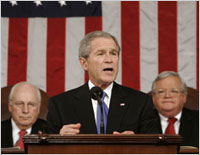Democrats to Bush: You are no longer solely in charge
Emboldened congressional Democrats are doing their best to drown out President George W. Bush's State of the Union speech with two themes: Sending more troops to Iraq is not a new strategy, and the president and his Republican allies are no longer solely in charge of national policy.

"I don't particularly view this surge program as a change in strategy at all," said freshman Democratic Sen. Jim Webb, the Vietnam veteran chosen to deliver his party's response to Bush's speech Tuesday night.
"I don't see it as strategic, other than perhaps politically strategic," Webb said in a conference call Monday with reporters. "It's just a lot more flailing around rather than coming up with something specific that's going to end our involvement and bring better stability to the region."
Democrats delivered that same message when Bush unveiled his plan two weeks ago. In recent days, party leaders have amplified to assert that Democrats with their newly-won majority in both houses of Congress intend to play an equal role with Bush in shaping national policy.
They even called their opening salvo "The State of Our Union" - speeches given Friday by Senate Majority Leader Harry Reid and House Speaker Nancy Pelosi at the National Press Club - in an effort to frame the coverage in their terms.
Pelosi, the first female speaker of the House, appropriated the traditional key line of any president's annual speech to Congress.
"The state of our union is strong," she declared.
Strong, but troubled by an unpopular and costly war, Democrats say. Bush is expected to continue to argue that the current challenge is winning, and winning can't be done without his proposed increase of 21,500 troops in Iraq.
Democrats have been treading carefully around several traps in the run-up to Webb's official response, which he will deliver from the Capitol's paneled Mansfield Room. Party leaders gave him an outline of what it should include. "I pretty much decided to write it myself, but with the understanding that I am speaking for the Democratic Party," Webb said.
Whether to continue funding the war and Iraqi reconstruction is perhaps the most prickly question for Democrats.
Reid last week rejected the notion that Congress would withhold funds for the war in an effort to force Bush to end it. Pelosi's message was more nuanced. The war should not be "an obligation of the American people in perpetuity," she suggested on ABC's "Good Morning America" program on Friday.
She suggested Bush had political motives for the surge in troops, a suggestion the White House called "poisonous."
Webb told reporters Monday that his "gut instinct" is to vote against more U.S. cash to be spent on Iraqi reconstruction until he's received a full accounting of the money already expended on it. In recent interviews he has drawn a connection between American dollars being spent on Iraqi reconstruction and those being spent to help New Orleans and the Gulf Coast recover from the ravages of Hurricane Katrina, prompting questions about whether he wants reconstruction money diverted from Iraq to Louisiana, Mississippi and Alabama, the AP says.
"If we're putting all this money into Iraq and ignoring New Orleans, then we're doing something wrong," he told reporters.
But he wouldn't say whether that sentiment would find its way into his speech Tuesday night. A knowledgeable Democratic official who spoke on condition of anonymity said the issue did not appear in an early draft.
"I do not intend to deliver a particularly partisan speech," Webb said.
Subscribe to Pravda.Ru Telegram channel, Facebook, RSS!




